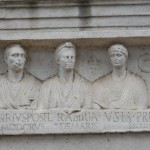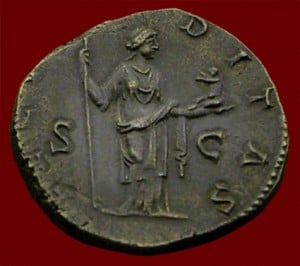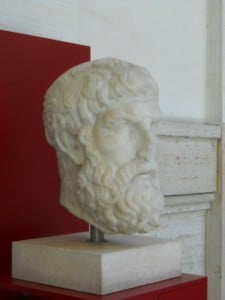When Rome was faced with a grave crisis it turned to the one man thought capable to lead them. Senators thus went to the home of Cincinnatus to offer him the position of magister populi (dictator). They found him in his field, plowing the land as a simple farmer, and when he had succeeded in his duties to Rome, he laid down the instruments of power and returned to his fields. Cincinnatus was a model of the “good citizen,” exemplifing the idealized citizen-soldier even in the American Revolution. The idealized life of a Roman citizen was to live a simple life on a piece of land that was no more than one man could work. The basic unit of land, called an iugerum (240 x 120 feet), was what a man with a team of animals could plow in a single day. Two iugera, approximately one and an half acres of land, was considered the minimum that a man needed to support his family and make a little profit. Two iugera provided enough land for his simple house with a vegetable garden, along with a field of grain, an orchard, and a few grape vines – enough to sustain his family. A typical small Roman farm had five iugera, which is what was given to Roman veterans when a new colony was established. That is, they were provided with the means to make a profit for themselves, and for Rome, in return for the service they had already given to Rome. But it was left to the individual to make something of the land he worked.
The Stoic Epictetus said, “He who is discontented with what he has and what has been granted to him by fortune is a layman in the art of life. But he who bears it nobly, and acts rationally with regard to all that arises from it, deserves to be acknowledged as a good man.”
When applied to a man’s occupation, in particular to farming, Pliny wrote, “Mehercule! the very best plan of all is to let moderation guide our judgment in all things. To cultivate land well is absolutely necessary, . . . indeed, the work is done by the hands of a man’s own family.” A good example of the “good man” making something of what he has is the story related by Pliny [Historia Naturalis 18.8 (41)].
“C. Furius Chresimus, a freedman, having found himself able, from a very small piece of land, to raise far more abundant harvests than his neighbours could from the largest farms, became the object of very considerable jealousy among them, and was accordingly accused of enticing away the crops of others by the practice of sorcery. Upon this, a day was named by Spurius Calvinus, the curule ædile, for his appearance. Apprehensive of being condemned, when the question came to be put to the vote among the tribes, he had all his implements of husbandry brought into the Forum, together with his farm servants, robust, well-conditioned, and well-clad people, Piso says. The iron tools were of first-rate quality, the mattocks were stout and strong, the plough-shares ponderous and substantial, and the oxen sleek and in prime condition. When all this had been done, “Here, Roman citizens,” said he, “are my implements of magic; but it is impossible for me to exhibit to your view, or to bring into this Forum, those midnight toils of mine, those early watchings, those sweats, and those fatigues.” Upon this, by the unanimous voice of the people, he was immediately acquitted. Agriculture, in fact, depends upon the expenditure of labour and exertion; and hence it is that the ancients were in the habit of saying, that it is the eye of the master that does more towards fertilizing a field than anything else.”
Self-sufficiency, frugality, and moderation in all things are the values of a Roman life, which are reflected in the Religio Romana. Underlying these values is also the sense of duty and service to our families, our country, and to the Gods. While not all of us today are farmers or gardeners, the values of a well-managed life, in the service to others, still guides us and cultivates our spiritual life.











